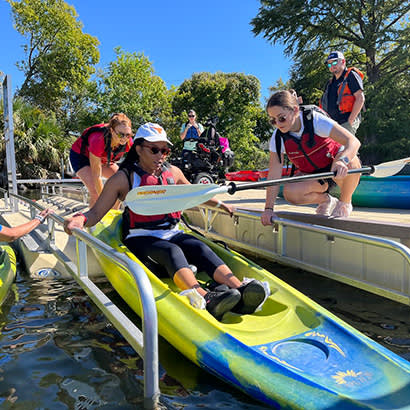
For an enhanced digital experience, read this story in the ezine.
Have you ever wondered how we can move from just making outdoor spaces “accessible” to truly making them “inclusive”? As park and recreation professionals, we understand the therapeutic benefits of outdoor recreation. Unfortunately, outdoor spaces have not always been welcoming to everyone. The ADA defines the minimum standards for accessibility for park and recreation agencies, but inclusion is about going beyond that to ensure everyone feels welcome and included in these spaces. To bridge the gap, park and recreation professionals throughout the United States are implementing innovative strategies for connecting the disability community with outdoor health-promoting experiences.
The Camacho Activity Center (Camacho) in Austin, Texas, specializes in outdoor recreation, nature education, and inclusion and adaptive activities. It aims to promote inclusivity in outdoor recreation by offering adaptive paddling, skill-building volunteerism and nature immersion programs for people of all ages with disabilities. Camacho staff listen to the community, build relationships, ensure the center’s equipment works for everyone and hire professional staff dedicated to inviting people in.
Community Engagement
Located in the Holly neighborhood of downtown Austin, Camacho serves a community that historically has been excluded from outdoor recreation. The 1928 Master Plan that divided the city by race and redlining, along with the Holly Street Power Plant that operated from 1960 to 2007, negatively impacted residents’ health and access to outdoor activities. To promote healing and address historical and structural inequalities, Camacho recognizes the need to make outdoor activities more inclusive for people with disabilities. Camacho was named after Lorraine “Grandma” Camacho, who fought for the closure of the Holly Street Power Plant and worked tirelessly to improve the health and quality of life for her community. Thanks to community input and advocacy, Camacho staff have expanded the paddling program with a universally accessible boat dock to include people with physical disabilities in watercraft programs.
Building Relationships
Camacho staff collaborate with local groups to identify gaps in programs and services and work together to fill them. They have collaborated with Lone Star Paralysis and Spero Rehab, among others, to provide adaptive paddling for people with spinal cord injuries.
Adaptive Equipment
Ryan Eaker, the supervisor at Camacho, is committed to finding top-
quality adaptive equipment to ensure comfortable, safe and high-
performance paddling. Recently, his team added portable transfer benches and wheels, making their entire adaptive paddling operation mobile. But Eaker’s team knows that there is no one-size-fits-all solution when it comes to adaptive equipment.
Eaker says, “We have expanded knowledge in a growing field of adaptive equipment; what works, what doesn’t. Just like every person is unique, so is the problem solving required to make adaptations for each individual.” That’s why they are always on the lookout for new ideas and innovations in this growing field of adaptive equipment. Thanks to combined efforts, Camacho’s adaptive paddling participants can now enjoy kayaking and canoeing without any barriers and explore new places that were once inaccessible.
Elena Christopher, CTRS, CPRP, is Recreation Programs Specialist at Camacho Activity Center.

